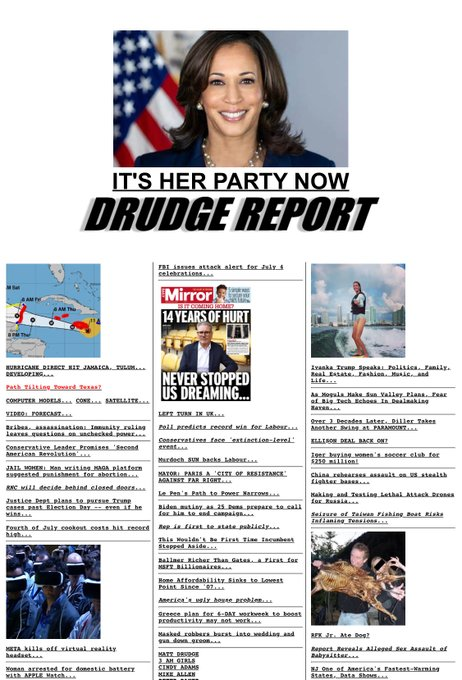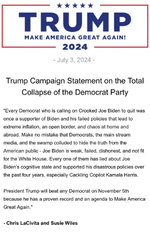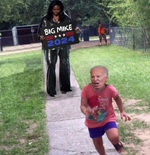Is it bad I’d rather her than Kamala? But let’s be honest, AOC is the cats paw for the Cathedral and a total Chuck Schumer disciple. Her job is to be on the internet dot com. They even threaten to district her out if she acts up from time to time.Eh they should have gone with Aoc. At least the average leftist likes her. And enough independents know who she is . And she’s not old, in fact would barely meet the age minimum to be president
You are using an out of date browser. It may not display this or other websites correctly.
You should upgrade or use an alternative browser.
You should upgrade or use an alternative browser.
2024 Election Lounge
- Thread starter Thomas More
- Start date
A Harris-Whitmer ticket would at least be very entertaining.
Similar psychodynamics like with Bush and Cheney.
Similar psychodynamics like with Bush and Cheney.

Meanwhile...
Hopefully it will be AOC because then you just know that the home movie that someone has somewhere for those boobies will come out.I know this is faint praise, but she is better than Kamala!
I obviously wouldn't vote for her, but I bet if the Dems put her up as the candidate, she would get more votes than Kamala would.
As far as doing the job, both would be extreme woke leftist disasters, but again, I think AOC might at be better that than Kamala. On a scale of 1 to 10, Kamala might be a 1, and AOC would be a 2!
I don't see any other potential Dem candidates that I'd rate much higher.
Full text
NEW: Hollywood Democratic megadonor Ari Emanuel torches President Joe Biden
“I talked to a bunch of big donors, and they're moving all their money to Congress and the Senate.”
"He gave us a bunch of malarkey, and I'm really pissed. We all should be really pissed."
"He is not the candidate anymore. This is a legal issue now. You can no longer remove him in three swing states: Pennsylvania, Wisconsin, and Michigan. There's only one democratic congress. Michigan.
They have to vote to remove him. I don't believe the Republican party in Pennsylvania and Wisconsin will do that. And, if they do, it's then Kamala Harris. This is legal, so lawyers will have to look at this.
Now, there are some questions about whether the delegates can do something... The lifeblood of a campaign is money, and maybe the only way this gets solved is if the money starts drying up.
It's a legal issue now... but we're in f--- city."

SCOOP: We have confirmation from inside sources that leftist GOTV groups are STOPPING ALL GOTV while they are lining up the switch to Kamala.
Campaign is working to rebrand and identify the likely VP nod and starting efforts to rebrand to the black community who have disdain for Biden in key states.
Note: GOTV = Get Out The Vote
Big Mike has no interest in public office , as a total introvert and also big Mike is big Mike
The most fervent Trump detractors will sometimes go as far as to intimate that he is in on it all, in league with the people he rails against. Meaning the last 10 years have been the biggest kayfabe in US history. This doesn't make sense when you consider that the pre-Trump Right was hopeless. Obama's election did invigorate the various factions on the right, which made some waves in the shape of the Tea Party, but as a political force it didn't achieve that much. Perhaps its biggest political achievement was getting rid of Eric Cantor in a primary in 2014, but by then the movement had been co-opted by the GOP establishment. Having seen off the threat from the right, they were preparing us for Jeb Bush vs Hillary in 2016, and some version of that for every election for the rest of time.Thats a very good point. If Trump did not care and was not a patriot why would he go up against the globalist establishment like this. I am not from USA so I don't know but seems to me he and his family is paying a huge cost and as far as I can see his presidency seemed pretty moderate, his sin is really going against globalism. Just my opinion, really interested in what others think in this regard.
The theory of Trump as controlled opposition is at that he was introduced in order to placate an angry right wing. But in 2014 tip of the spear of right wing animus was Sean Hannity and Bill O'Reilly on TV every night playing footage of unrest in Ferguson and lamenting leftist cop hatred. Hardly revolutionary. Is the argument really that Fox News boomers were about to rise up and march on Washington DC, so the regime had to give them Trump to calm them down? The alt-right, or dissident right, whatever you want to call it, was still obscure back then, and very online, thus easily dismissed. In light of that, why would you then purposely introduce the most disruptive political figure of modern times? You could just roll with Jeb! and either the GOPe wins or suffers yet another principled loss to Hillary, who you could work with anyway.
The fact is Trump changed everything when he entered the race in 2015, both because of who he is as well as the message he was pushing. Because of his celebrity and universal name recognition he could not be ignored by the public, and because of his money he couldn't be brushed aside by the political class. His presence combined with the parallel rise of social media enabled dissident right views to leak into real world politics, which resulted in legitimate opposition to the regime for the first time in decades.
Despite strongly disagreeing with its implementation since, Trump detractors no doubt still agree with Trumpism/MAGA as written on paper, derived from 2016 rhetoric. I am sympathetic to criticism coming from that angle, but it does not negate the utility of Trump winning again, which is that despite unprecedented resistance from the US power structure, Trumpism becomes further established as legitimate. If Trump should win a second term, I will consider it success if he ends the Ukraine conflict quickly, stops war with Iran, and does something with immigration that will last beyond his time as president (like a real wall). Perhaps a low bar, but once again, he will operating in an environment with very few allies in any institution of power. Which is why legitimizing Trumpism is likely to be the most lasting thing he does, as the next generation of right-leaning leaders in business, law and politics will have been steeped in Trumpism for at least 10 years by the time his second term ends. So while Trump can't save America in 4 years, what he can do is create the conditions for a Trumpist faction of elites to wrest control at some point down the line.
Imagine locking down the black woman vote and urban overeducated woman vote in exchange for losing most of the black male vote and the white working class male D vote in its entirety.
The Dems have no good options at this point. Biden was rendered unelectable immediately after the debate, but Kamala has always been unelectable (remember that her Presidential campaign flamed out before Iowa). It doesn't matter how much they try to rehab her image or protect her in the media, she's a fake black woman (Indian/Jamaican descent who pretends to be ADOS) who somehow comes across as both incredibly stupid and even more unlikeable than Hillary Clinton, which is quite the high bar to clear. She's not nearly as popular among women and blacks as the Dems are hoping, and if they try to put Buttigieg as her running mate it will be even more laughable. Gretchen Whitmer is probably ambitious and dumb enough to sign on to such a shitshow, however, and would be a better pick, although she and Kamala would inevitably clash and hate each other in the way that only arrogant, ladder climbing careerist women can.
If the legal hurdles preventing any other candidate than Biden or Harris getting on a ballot in a few key states are truly insurmountable, then it's basically over for them. Which means they'll get even more desperate, and possibly try some crazy gambit to get the election cancelled or delayed, or else deploy their cheating apparatus to such an absurd and obvious degree that a coalition of the leading red states band together and refuse to certify the election results. Then things could get really hairy after that.
In hindsight, the Dems should have just kept Biden hidden in a closet, refused to debate Trump because he is an "insurrectionist" and continued to have the media gaslight the public about Biden being exceptionally sharp for his age. This is what I predicted they would do, and certainly is what I would have done in their shoes. Of course, being a party full of hysterical women and diversity hires, they screwed the pooch in a big way. And unfortunately, due to their desperation and stupidity, their mistakes will only continue to mount, and could end up causing huge problems not just for the Democrat party, but for the country as a whole.
If the legal hurdles preventing any other candidate than Biden or Harris getting on a ballot in a few key states are truly insurmountable, then it's basically over for them. Which means they'll get even more desperate, and possibly try some crazy gambit to get the election cancelled or delayed, or else deploy their cheating apparatus to such an absurd and obvious degree that a coalition of the leading red states band together and refuse to certify the election results. Then things could get really hairy after that.
In hindsight, the Dems should have just kept Biden hidden in a closet, refused to debate Trump because he is an "insurrectionist" and continued to have the media gaslight the public about Biden being exceptionally sharp for his age. This is what I predicted they would do, and certainly is what I would have done in their shoes. Of course, being a party full of hysterical women and diversity hires, they screwed the pooch in a big way. And unfortunately, due to their desperation and stupidity, their mistakes will only continue to mount, and could end up causing huge problems not just for the Democrat party, but for the country as a whole.
Absolutely one of the best posts in them matter I've seen in a long time.The most fervent Trump detractors will sometimes go as far as to intimate that he is in on it all, in league with the people he rails against. Meaning the last 10 years have been the biggest kayfabe in US history. This doesn't make sense when you consider that the pre-Trump Right was hopeless. Obama's election did invigorate the various factions on the right, which made some waves in the shape of the Tea Party, but as a political force it didn't achieve that much. Perhaps its biggest political achievement was getting rid of Eric Cantor in a primary in 2014, but by then the movement had been co-opted by the GOP establishment. Having seen off the threat from the right, they were preparing us for Jeb Bush vs Hillary in 2016, and some version of that for every election for the rest of time.
The theory of Trump as controlled opposition is at that he was introduced in order to placate an angry right wing. But in 2014 tip of the spear of right wing animus was Sean Hannity and Bill O'Reilly on TV every night playing footage of unrest in Ferguson and lamenting leftist cop hatred. Hardly revolutionary. Is the argument really that Fox News boomers were about to rise up and march on Washington DC, so the regime had to give them Trump to calm them down? The alt-right, or dissident right, whatever you want to call it, was still obscure back then, and very online, thus easily dismissed. In light of that, why would you then purposely introduce the most disruptive political figure of modern times? You could just roll with Jeb! and either the GOPe wins or suffers yet another principled loss to Hillary, who you could work with anyway.
The fact is Trump changed everything when he entered the race in 2015, both because of who he is as well as the message he was pushing. Because of his celebrity and universal name recognition he could not be ignored by the public, and because of his money he couldn't be brushed aside by the political class. His presence combined with the parallel rise of social media enabled dissident right views to leak into real world politics, which resulted in legitimate opposition to the regime for the first time in decades.
Despite strongly disagreeing with its implementation since, Trump detractors no doubt still agree with Trumpism/MAGA as written on paper, derived from 2016 rhetoric. I am sympathetic to criticism coming from that angle, but it does not negate the utility of Trump winning again, which is that despite unprecedented resistance from the US power structure, Trumpism becomes further established as legitimate. If Trump should win a second term, I will consider it success if he ends the Ukraine conflict quickly, stops war with Iran, and does something with immigration that will last beyond his time as president (like a real wall). Perhaps a low bar, but once again, he will operating in an environment with very few allies in any institution of power. Which is why legitimizing Trumpism is likely to be the most lasting thing he does, as the next generation of right-leaning leaders in business, law and politics will have been steeped in Trumpism for at least 10 years by the time his second term ends. So while Trump can't save America in 4 years, what he can do is create the conditions for a Trumpist faction of elites to wrest control at some point down the line.
Bravo!
In hindsight, the Dems should have just kept Biden hidden in a closet, refused to debate Trump because he is an "insurrectionist" and continued to have the media gaslight the public about Biden being exceptionally sharp for his age. This is what I predicted they would do, and certainly is what I would have done in their shoes. Of course, being a party full of hysterical women and diversity hires, they screwed the pooch in a big way. And unfortunately, due to their desperation and stupidity, their mistakes will only continue to mount, and could end up causing huge problems not just for the Democrat party, but for the country as a whole.
I’m surprised we even had a debate as well. Biden’s handlers could have said “he’s a felon and a threat to our democracy , no debates”, and only had a handful of short and carefully crafted public appearances to keep the charade going.
But you can’t put the toothpaste back into the tube.
The donors are going to starve the Biden campaign. If he does step aside it looks like Harris. Which is comical as the democrats hate her.
One other option, they could invoke the 25th amendment . I’m a bit surprised that option isn’t being talked about more? That would force the president out because of his health.
Edit I’m also surprised no one is mentioning Fetterman as a replacement . He’s basically exactly what they want.
It’s like we have entered the twilight zone. For years the entire machine worked to run cover for Biden’s losing his mind. Now they just want him gone
Last edited:
Full text
NEW: CNN's Van Jones says there is a "full-scale panic" behind the scenes as Democrats figure out how to replace Biden after the debate.
"People are passing around legal memos. PDFs are flying back and forth on WhatsApp, trying to figure out what are the options. How can you replace Biden?"
"How do you do it in a way that he feels respected?"
"Who should Kamala Harris's Vice President be?"
"The conversations on air and the conversations off air are completely different."
"He may not be able to get across the finish line... There is a big conversation happening right now about how this happens, not whether.”



